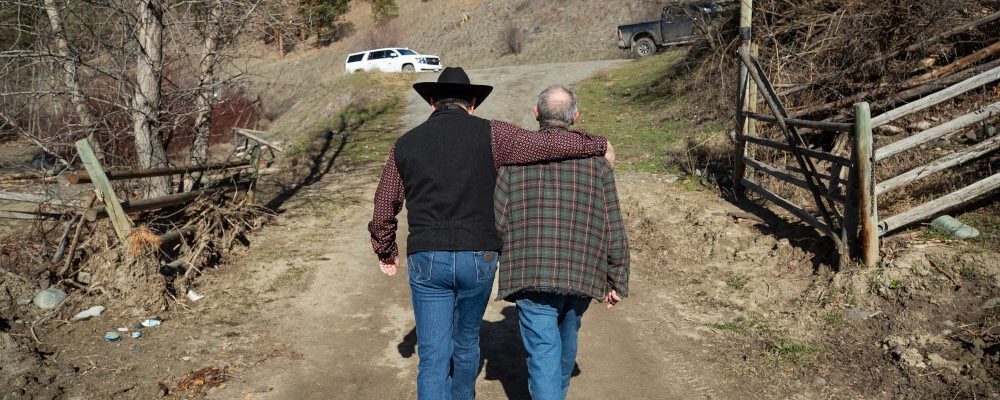I hate black-eyed Susans.
Their blooms dotted throughout the fields bowing in the hot August heat meant summer break was about to end. Growing up on a farm I learned to measure time by the rhythms of nature. Staring up into the dark clear nights to find the Big Dipper hanging handle to the horizon told me winter was here to stay for some time. Dark and early mornings in the musty barn bottle feeding a newborn calf was the first sign spring was around the corner. Opening the school bus window to smell the fresh cut of hay in mid-June meant summer break was about to start.
For kids across rural Canada, my childhood was just like theirs, these natural markers completely common. For us, responsibilities came at an early age, hard work was a point of pride, and helping the neighbours was expected. Everyone pitched in all the time. Almost every rural family embodies these values and a sense of community that relies on each other, not some far-away government program. When the tractor gets stuck your neighbour and his bigger tractor come over to pull you out. When the farmer down the road shows up because their cows got out, it doesn’t matter if you are mid Christmas dinner, you put your boots on and help. That meant us kids too—feeding chickens before catching the bus to school, throwing hay bales in the summer, or helping to mend fences.
It’s a practical life, and deeply rewarding, but it is one that can be dismissed or misunderstood by our friends in the city.
Arguments are made these days that the social and political divide is rural versus urban. And yet regardless of where someone chooses to live, the desires are the same. Everyone wants their kids to go to a good school, to feel safe walking down the street they live on, to show up to the hospital and know they will be taken care of. We all want the same things in our lives. So where does the hostility come from?
Growing up we would drive from our peaceful little farm to the big city of Toronto to visit my extended family. I knew we were close when my parents started remarking to each other about how close the homes were built. Stacked one upon another. My family couldn’t understand the appeal. Not that we didn’t recognize the charms of city life. Friends to play with down the street, restaurants to enjoy, and going to see the Raptors play. But when we headed for home, away from the bright lights to where the stars shone clear again, I felt free.
When I left for university, I started to notice the tangible difference between how I grew up and how my friends in the city grew up. I dressed differently; my t-shirts were of every NASCAR track I had been to. There was never much point caring about clothes, who would care? The cows? I didn’t watch much TV growing up and Sundays were for church. All the cultural references were lost on me. I was an ice cube thrown into a pot of boiling water.
The aspects of my life that I treasured and clung to were mostly foreign to my peers. They didn’t know about black-eyed Susans; they couldn’t see the Big Dipper. I felt like an outsider. Hillbilly was not said as a point of pride—here it meant that my life experiences were inadequate, that I was not cultured in the right ways. The labyrinth of social norms was meant to highlight that I didn’t belong. I went to the GAP and bought a turtleneck.
Life marched on and my city-born husband and I had two sons. Children sharpen the senses. How would we raise these young men and what values did we want to teach them? My husband knew he married a hillbilly. He came with me to NASCAR, and he loved the stars. But I’d look out the window of our suburban home and think: “look how close our neighbours are”. It was time to get out. I wanted my boys to hate black-eyed Susans too. I dug my NASCAR t-shirts out of the closet and started packing. My relentlessly patient husband got on board and we moved to an acreage.
The impacts and incentives of public policy are often urban-centric, dreamt up by people that don’t understand a rural way of life. These policies have often been frustrating and cumbersome for those of us outside the cities. However, no such policy had really been a lightning rod to rally the ire of rural people across the country at once.
That was until COVID came along.

Measures meant to protect people who live in dense communities where degrees of interaction are high were outlandish on the family farm. The rationalizations for these were often comical. Barbershops would be ordered closed in a community no one in the city knew the name of, where there wasn’t a COVID case within 100 kilometres. All under the auspices that maybe someone from the city would be desperate for a haircut and drive out of town.
Our friends in the city faced COVID first, and the fears and concerns they had were legitimate and valid. But our bonds started to fray. Rural communities overwhelmingly wanted policies that reflected our lifestyles—ones that recognized that we share a different sense of community, have a different relationship with our neighbours, and don’t work in highly populated environments. That calving doesn’t care about COVID and crops come off the field when they are ready, not when measures have been lifted. Our urban friends didn’t understand. Their valid and realized fears of the devastating impacts of the disease made the health measures inflexible for rural lifestyles. The tone was judgmental and severe. Rural people felt attacked, misunderstood, and desperate. It never changed and the breakdown was never addressed.
COVID measures were eventually lifted and people mostly went back to their lives as before. The fabric that weaves us all together hasn’t been woven back together, though. Do our friends in the city know or care that their friends in the country feel betrayed? Does it matter? Elections are won in cities; public policy is made in cities and by people who live in cities. All we ask is you cast your thoughts on us and the hopes and dreams we have for our kids when you develop public policy. Help us restore our communities together.
My family was driving into town the other day and as we merged onto the highway my husband remarked at how close the homes were built. He’d never noticed it before.
Choosing to move out of town was what was best for my family. I don’t want to live within 15 minutes of anything, never mind everything. Let us make the choice of how we raise our families and prioritize the way of life we inherited from our parents, our grandparents, and their parents. We mostly want to be left alone, to solve the problems we encounter on our own or with the help of our neighbours. And if things do get desperate enough that we come into town to meet with you, hear us out. Give us the chance to explain where we are coming from. That’s all we ask.




